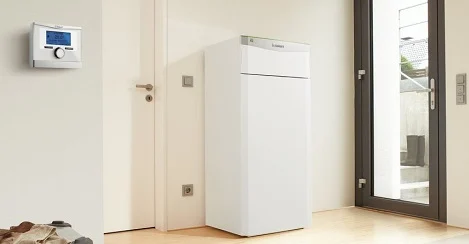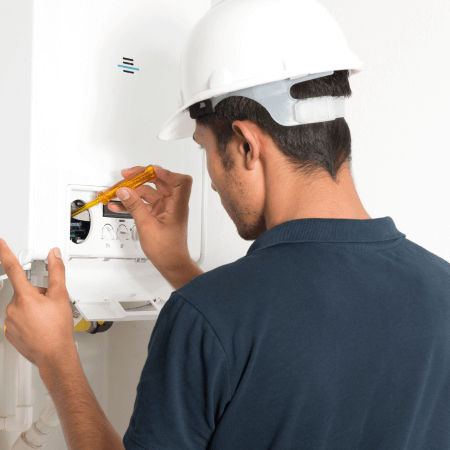Whilst gas-fuelled appliances continue to be the most popular way of heating our homes, doing so in a more efficient and eco-friendly way is now more important than ever. Not only will it benefit the planet by cutting emissions, going green will help cut bills too. And in a bid to help the UK reach the government’s target of hitting net zero carbon emissions by 2050, the Green Homes Grant scheme has been launched. This new incentive encourages homeowners and landlords to help make energy saving home improvements with the aid of government issued vouchers.
Here we’ll explain all about the Green Homes Grant, how you can secure renewable energy jobs in the near future and how City Plumbing can help you.

What is the Green Homes Grant and how does it work?
The Green Homes Grant is an incentive-based scheme in which the government will pay up to two-thirds of energy saving home improvements up to £5,000 – with low-income homeowners being able to claim 100%. The vouchers will be issued to homeowners and landlords and will run until March 2021.
The home improvement measures available under the scheme are split into ‘primary’ and ‘secondary’ measures. The voucher must be used to install at least one primary measure before the voucher can be used to help cover the cost of a secondary measure. To obtain a voucher, homeowners and landlords in England will be able to seek advice from the Simple Energy Advice (SEA) service website.
Energy saving home improvements covered by the scheme include heat pumps, biomass and solar thermal heating solutions, insulation, underfloor heating, radiators and double glazing, but gas boilers are not included – instead, people are being urged to go for low-carbon heating alternatives.
Under the scheme, the Treasury claims that utilising these vouchers could help families make an average annual saving of £200 on their energy bills. But it’s not only homeowners and landlords who will benefit, business secretary Alok Sharma says: “[The scheme] will create new work for many thousands of talented builders, plumbers, and other tradespeople right across the UK.”
Currently only homes in England are eligible for the scheme, but new-build and non-domestic properties are exempt.
What are the primary saving measures?
With so many different heating systems to choose from, it can be confusing to know which one is the right type for your property. The heating system in your home isn't 'one size fits all'. And having the incorrect central heating system installed could make your bills higher than they should be, reduce the energy efficiency of your home, or even fail to heat your home adequately.
Before you make any hasty decisions, it's important to read our guide to get a better understanding of the types of central heating systems out there. You should also get professional advice so that your new system is fit for purpose.
Gas central heating
Gas central heating is the most common heating type in the UK and is often the cheapest option if you're looking to update your system. The type of gas boiler you require depends on the size of your property, as well as the number of bathrooms, the space for the boiler, the current radiator system and the water pressure.
Gas combi boilers - A gas combi boiler is a compact unit acting as both a high-efficiency water heater and central heating unit. These are a popular choice for domestic properties thanks to their minimal pipework and energy-saving and cost-effective properties.
Gas system boilers - System boilers require a hot water cylinder to store the hot water they generate. They reduce the need for a loft tank and so are ideal for homes with limited space. Most components are built in, making for a quicker installation. They are perfect for homes with more than one bathroom and they can be used with solar water heating systems for environmentally conscious properties.
Gas heat only boilers - Another great option is heat only boilers, which work in conjunction with a hot water tank on an open vent or sealed heating system (often stored in the loft). They are ideal for homes with a traditional heating system linked to a hot water cylinder. If you don’t want to or need to replace the current system, a heat only boiler may be the best option for you.
Electric central heating systems
Because some homes don't have access to mains gas, electric heating systems are one of the alternatives. Electric heating is a great option when considering how best to heat a space, because there's a lot less to think about when it comes to the installation of electric heating. However, electric heating systems are often more expensive than traditional heating systems.
LPG central heating systems
LPG stands for liquid petroleum gas. It is a highly efficient fuel for central heating if your home is not connected to mains gas. Properties in rural areas tend to use LPG heating systems. LPG is delivered to your home and stored in an outdoor tank, which is then transferred to your heating system when you need it. LPG boilers are efficient and cost-effective as they provide heating on demand by only warming water when the source is turned on.
Air source heat pumps
Air source heat pumps are highly efficient heating systems that provide a renewable energy alternative. They work by extracting heat from the air outside and use it to heat your home and/or water for your radiators, underfloor heating system, and domestic water. What you might not know is that they can be installed either in addition to your existing heating system or as a replacement.
While air source heat pump installation can be costly, in the long run you'll save money. You'll have cheaper heating bills, as well as easy maintenance. You can even earn money through the government's Renewable Heat Incentive (RHI) Scheme which means you can earn money by generating your own energy.
ASHPs are great for both retrofits and new builds. While they work better with underfloor heating systems, if this is not accessible, large radiators are recommended.
Ground source heat pumps
Ground source heat pumps are another type of renewable heating system, using a ground loop or borehole to extract heat from the ground. They run on a small amount of electricity to extract heat from the ground which can then be used to produce hot water for taps, showers and central heating.
All new buildings constructed in the UK were designed to meet the Building Regulations and are able to profit from a ground source heat pump. These regulations have been introduced to ensure the conservation of fuel, reduce heat losses, and create greater energy efficiency in order to make sure all modern buildings need less heating.
Like air source heat pumps, ground source heat pump installation isn't cheap, but their energy efficiency, lower maintenance costs, as well as various incentive payments make them an exciting prospect if you're looking to reduce your carbon footprint and reduce your energy bills.
Solar thermal
The most commonly known type of green energy, solar power systems are one of the best ways to power your home. Although the initial investment can be significant, you are basically getting free energy for as long as you remain at the property.
The same is true with solar heating, which generally comes in two formats: hydronic collectors and air systems. Hydronic collectors heat liquid to warm up the house, while air systems work more like traditional HVAC systems.
While a solar water-heating system will provide a significant amount of your hot water it is unlikely to deliver all the water you need and you will need to top up with a boiler or immersion heater for those days when the sun is hidden behind thick clouds – especially during winter months.
Come to the central heating system experts
If you'd like to find out more about our energy-efficient heating systems, we have a dedicated in-house team of design and estimating experts who can specify and design the appropriate products for your energy saving home improvement jobs.
We offer:
- Impartial system advice
- Indemnified designs
- Fast quotation turnaround
- Complete project solutions
- National logistic availability
Other articles

Things you should check if your boiler isn’t working
22 Mar 2022 ・ 8 mins

Radiator Buying Guide: which radiator should you choose?
22 Mar 2022 ・ 7 mins

What is a boiling water tap?
22 Mar 2022 ・ 4 mins



